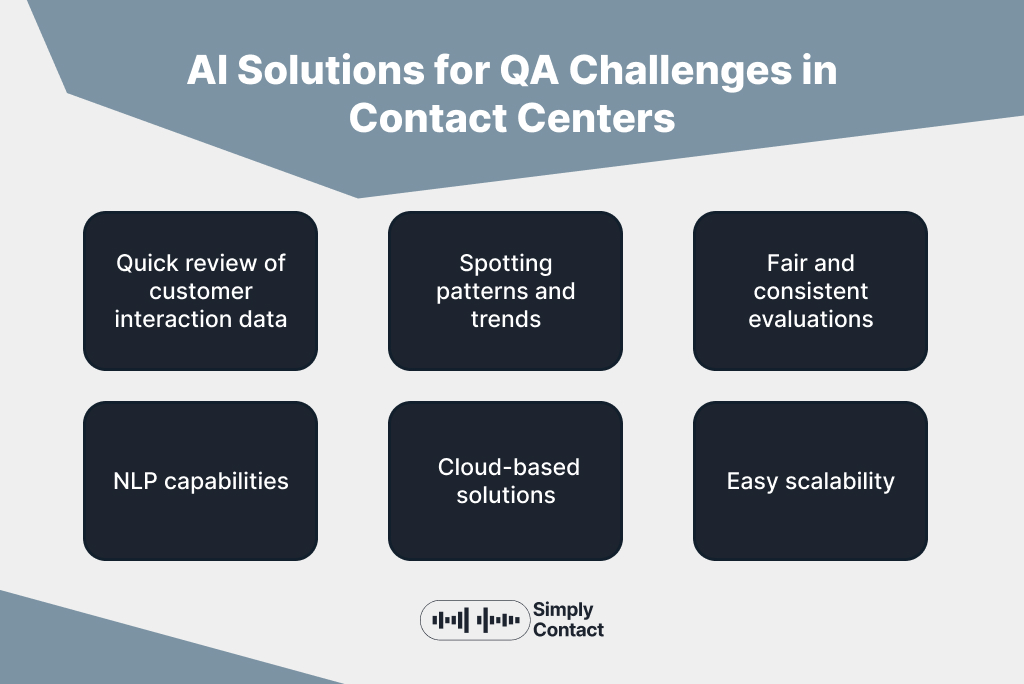At Simply Contact, we use AI to streamline contact center quality assurance, ensuring accurate evaluations, faster insights, and improved performance. Let’s optimize your QA process and deliver superior customer experiences.

The modern-day business model is relatively more fast-paced, and when it comes to interacting with customers, contact centers serve as the forefront. In these situations, the only way to maintain customer satisfaction and loyalty is by delivering outstanding quality assurance (QA).
Traditional QA methods often face problems that can reduce accuracy and efficiency. This is where artificial intelligence (AI) comes in. AI has become a part of many areas of our lives, including work that requires human-like intelligence.
AI is used in many ways, such as in chatbots, data analysis, and driving assistance. It's especially helpful in many industries for different tasks. AI has also changed how contact centers handle their QA processes. Now, let's look more closely at AI in quality assurance and its effects on contact centers.
The challenges of traditional QA in contact centers
One of AI’s most significant uses is its ability to revolutionize customer experiences (CX).
With rapid technological developments, customer contact centers can now utilize valuable information in multiple ways, gain efficiencies, redefine ways of engaging and interacting with customers, and leverage in-depth insights to enhance quality management and the overall customer journey.
Once you see all the benefits of AI for quality assurance and management, you can move beyond basic improvements and significantly enhance the B2B and B2C customer experience.
However, to successfully use automated AI in quality assurance, it's crucial to understand the challenges and considerations. You also need to have a clear plan for addressing these issues.
With that in mind, let's examine some of the most common challenges faced by traditional quality assurance processes in contact centers.

Bias and ubjectivity
People often have biases that affect how they view customer interactions or questions. This can make their evaluations unfair and inaccurate.
Biases are usually related to cultural differences in customer responses. But any kind of bias or personal opinion can make feedback and assessments unreliable.
Also, people might use different standards when judging something, leading to inconsistent feedback.
This inconsistency makes it hard to train and guide staff effectively.
Time-consuming manual tasks
Contact centers handle many customer interactions and support requests daily through live chats, emails, or phone calls.
Reviewing each customer interaction manually requires a lot of time and effort. Relying solely on people for quality checks can lead to significant issues.
For example, people might miss important details or misunderstand what customers say when checking. This leads to inconsistent evaluations and the risk of overlooking major issues.
Difficulty in expanding
When demand increases and your contact center gets busier, managing the growing number of interactions can become very challenging.
This increase can overwhelm your traditional quality assurance methods. Since these methods are often manual, they struggle to keep up with the rising number of calls and workload.
Traditional quality assurance methods also lack the technology needed to manage large amounts of data efficiently. This major problem prevents a complete review of all customer interactions.
As a result, only a few customer interactions are thoroughly examined, meaning agents might miss important questions, issues, or trends.
To overcome these challenges, it's important to use automation and technology. These tools can help streamline your quality assurance processes, reduce bias, and scale up effectively.
Introducing new technologies like machine learning (ML), sentiment analysis, and speech analytics can automate the evaluation of customer interactions.
These technologies also improve consistency and make handling a surge in customer interactions easier.
AI solutions for overcoming traditional QA challenges in contact centers
In today's fast-changing, customer-focused world, companies need to use the latest AI tools and processes in their contact center QA programs to stay competitive.
By using a strong AI-supported QA system, companies can satisfy their customers, build loyalty, retain their best employees, encourage continuous improvement, and reduce costs.
Now, let's look at how AI helps overcome the quality assurance challenges mentioned before.

Quick review of customer interaction data
AI systems can quickly process a lot of customer interaction data. This automation means people don't have to spend their valuable time on slow, manual reviews.
AI can analyze big datasets quickly, providing detailed insights into customer interactions and highlighting areas that need praise or improvement.
Spotting patterns and trends
It's hard for human agents to spot trends or patterns in customer interaction data. However, AI algorithms can do this quickly and efficiently.
AI can sift through large datasets to find small details or ongoing issues in interactions between customers and representatives.
These insights are very useful. They help companies act early on potential issues, improving customer service quality.
Fair and consistent evaluations
AI systems use ML algorithms to set fair and consistent evaluation standards. Unlike people, who may have biases, AI ensures that every evaluation is based on clear, predefined criteria.
This leads to uniform evaluations and increases the reliability of high-quality assessments in all customer interactions.
Natural language processing (NLP) capabilities
Thanks to natural language processing (NLP), AI systems can understand and analyze language.
Their main task is to identify customers' feelings and satisfaction by analyzing the emotions expressed during conversations.
With NLP, businesses can gain insights into what customers like and how they feel, improving direct communication with them.
Cloud-based solutions
Artificial intelligence QA solutions are mainly cloud-based. This means they offer businesses the ability to adapt and be flexible. These cloud platforms are easy to set up and can seamlessly work with your existing systems.
This eliminates the need for large infrastructure investments. Additionally, by regularly updating and configuring your cloud-based solutions, you can keep them up to date and ensure they meet industry standards and QA needs.
Easy scalability
Quality assurance solutions powered by AI are highly adaptable and can scale up easily. This means they can manage many customer support requests without slowing down or losing accuracy.
If your contact center's workload grows or becomes unpredictable, these AI systems can quickly adjust to meet the new demands. This ensures that your customer evaluations remain consistent and reliable, even when demand fluctuates.
At Simply Contact, we've got a lot of experience with this. We've worked with clients who see big differences in customer inquiries during high and low seasons, ensuring their customer service stays excellent throughout the year.
Interested in learning how we can help your business thrive through seasonal shifts? Explore more about our Outsourced Support Services by following this link.
The remarkable benefits of AI for contact center QA
| Lower agent turnover | Quick and accurate feedback from AI-powered quality assurance leads to a more motivated team. This results in better performance, improved coaching, and a significant reduction in the number of agents leaving the job |
| Ongoing improvement | AI platforms take up information and learn in intervals, meaning they gradually become more efficient and drive continuous improvement in contact center operations |
| Clear overview of interactions | AI-powered quality assurance gives a full view of customer interactions. This helps in monitoring, coaching, and spotting areas for improvement while eliminating bias from evaluations |
| Better customer satisfaction | Using AI for quality assurance ensures consistent customer experiences. This leads to higher profits, better customer retention, and excellent customer satisfaction scores |
| Comprehensive coverage | AI ensures that every communication channel is checked thoroughly with tailored review methods, offering deep insights |
| Personalization and customer happiness | AI helps agents understand customer needs better, allowing for personalized service that increases customer happiness and loyalty |
| Instant customer feedback | Getting real-time feedback from customers is a major benefit for agents. It enables them to quickly identify and solve problems effectively |
| Compliance and risk reduction | Adding AI to contact centers makes sure all industry rules are followed, reducing the risk of legal issues, protecting the company's reputation, and ensuring compliance |

How AI improves Quality Assurance in contact centers: Practical uses and importance
Lately, a lot of contact centers are considering leveraging AI to bring about a drastic change in their customer interactions and operations. This major shift is driven by different AI-enabled opportunities, each aimed at enhancing the company's performance and productivity.
Having said that, let's explore some of the top AI solutions and their practical applications in transforming contact centers today.
Predictive analytics tools for forecasting trends
Predictive analytics tools are powerful because they can provide detailed insights in advance, even before customers ask questions or raise issues. These tools use AI algorithms to analyze past customer data and predict future events. The key to success with these tools is to gather all relevant customer information in one place.
The system can make accurate predictions by integrating various data points, such as financial transactions, interaction history, and customer preferences, demographics, and tastes.
In addition to gaining valuable insights instantly, your company can also understand customer behavior patterns for the future. Having predictive and immediate information allows the customer support team to manage interactions more effectively, increasing their efficiency and productivity.
For instance, using AI in contact centers to analyze customer feedback can lead to a 20% increase in customer retention rates. Here are some real-life applications of how you can use predictive analytic tools:
Proactive QA strategies
Contact centers can stay ahead by adjusting their quality assurance strategies based on predicted future customer trends and behaviors. This approach helps address potential issues before they escalate.
Resource allocation
Predictive analytics tools are crucial in contact centers for efficiently allocating resources. They enable you to schedule customer support agents according to expected busy times and call volumes.
Improved service delivery
By forecasting customer wants and requirements, contact centers can customize their services accordingly and expect to boost customer loyalty, satisfaction, and retention.
Speech analytics for performance monitoring
Speech analytics uses AI tools to analyze and transcribe conversations between agents and customers. These systems are fast and have simplified the task of checking if agents meet quality standards.
These tools also review every call made by agents to customers, removing the randomness in how supervisors choose calls to listen to. This makes quality assessments more effective and avoids biased evaluations.
Additionally, their ability to process natural language means these tools can turn conversations into clear summaries. This helps supervisors identify training needs and quickly spot key details for customer support agents. Below are some practical uses of speech analytics:
Targeted training and coaching
Contact center managers can use speech analytics insights to provide detailed and focused training for customer support agents, especially in areas where they're underperforming.
Quality Assurance
Speech analytics can transcribe customer calls into text using Automatic Speech Recognition technology.
This makes it easier for agents to check calls for compliance with regulations and guidelines. Speech analytics ensures your company meets industry standards and maintains consistent service quality.
Sentiment analysis for customer feedback
Sentiment analysis is a smart tool in AI contact centers that helps understand customers' feelings by analyzing their chats, emails, or calls. It uses AI to analyze these conversations and determine the emotions being expressed.
This process involves examining customer interactions to extract text from call records or chat histories. It also uses Natural Language Processing (NLP) to extract the gist of the emotions and overall situation from the text.
Based on customers' words, their feelings are identified as neutral, negative, or positive. Then, it highlights important feedback, especially where customers seem upset or unhappy. Here's how sentiment analysis is used in real situations:
Quick action
With sentiment analysis, agents can see how customers feel in real time. This means managers can quickly spot an unhappy customer and intervene immediately.
This allows them to address the customer's issues quickly, offer a solution, and greatly improve the customer's satisfaction.
Enhanced service
The insights from sentiment analysis help contact centers spot common problems or areas where many customers have trouble. This information lets them improve how they serve customers.

Best AI tools for contact center quality assurance
Contact centers can greatly improve their quality management by using AI tools. These tools help in making the process more effective and efficient. Here are some of the best AI-powered tools available:
| Predictive analytics software | This software analyzes past customer data to forecast future outcomes and trends. It helps contact centers predict call volumes, customer behavior, and agent performance. This enables managers to improve service levels and use their resources more effectively |
| Speech analytics platforms | These platforms use ML and NLP to analyze conversations between agents and customers in real time. They identify keywords, patterns, and sentiments to pinpoint areas for improvement in customer experience and agent performance |
| Virtual agents/chatbots | Virtual agents or chatbots use artificial intelligence to interact with customers through speech or text. They provide essential information, answer common questions, and escalate complex issues to human agents. Chatbots enhance efficiency in contact centers and offer 24/7 support |
| Quality management (QM) platforms | These platforms integrate various quality assurance processes, including feedback management, call monitoring, and coaching. AI-driven features automatically score performance based on set criteria, track trends in agent performance, and suggest customized coaching plans |
| Text analytics solutions | These solutions analyze written communications, such as chats, emails, and social media interactions. Using NLP, they detect trends, extract valuable insights, and identify ongoing issues |
| Performance management dashboards | These dashboards provide real-time insights into key performance indicators of a contact center, such as customer satisfaction scores and call volume. AI algorithms analyze this data to identify trends, deviations, and areas requiring urgent attention |
Wrapping up: Contact center QA made better with Simply Contact
Suffice to say, that artificial intelligence is here to stay, offering deep insights, better compliance, and enhanced customer experiences. These benefits are incredibly valuable for contact centers.
However, AI should not completely replace human customer service agents. Especially when it comes to QA, human evaluators should always make the final decisions. Even though AI will continue to play a crucial role in contact centers, it should be used as a support tool rather than a complete replacement for human agents.
Using AI for contact center quality assurance offers numerous benefits. It not only addresses the limitations of traditional methods but also opens up new opportunities for excellence and efficiency. Contact centers that leverage the power of automation and AI-driven insights can enhance their QA practices and deliver superior customer experiences.
Get fast answers to any remaining questions
Thank you.
Your request has been sent successfully.
Your request has been sent successfully.






